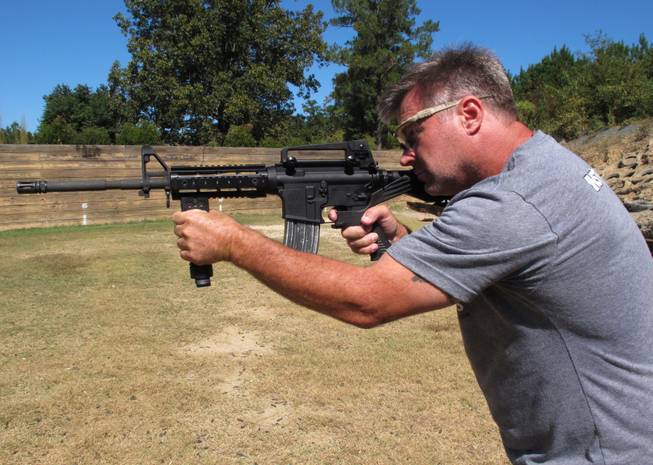
Allen G. Breed / AP
Shooting instructor Frankie McRae aims an AR-15 rifle fitted with a “bump stock” at his 37 PSR Gun Club in Bunnlevel, N.C., on Wednesday, Oct. 4, 2017.
Published Tuesday, Oct. 10, 2017 | 7:57 a.m.
Updated Tuesday, Oct. 10, 2017 | 2:22 p.m.
A national gun control advocacy group is partnering with a Las Vegas law firm in a class-action lawsuit against a leading bump stock producer over what they called negligent production and marketing of the products that violate the intent of federal law.
At least 12 such devices were found in the hotel room of Stephen Paddock, who fatally shot 58 Route 91 Harvest music festival attendees from his 32nd floor hotel room at Mandalay Bay on Oct. 1 and injured nearly 500 more, according to Metro Police. They did not specify the company that manufactured the devices.
The lawsuit, filed Friday in Clark County District Court by the Brady Center to Prevent Gun Violence and Las Vegas law firm Eglet Prince, asks Houston-based Slide Fire Solutions to cover the cost of counseling and other treatment associated with emotional distress and also seeks punitive damages.
“This case is on behalf of all festivalgoers who suffered emotional distress as a result of the shooting,” said attorney Robert Eglet. “We added punitive damage because we want to send a message so gun companies will not produce items negligently.”
The lawsuit claims that the manufacturer of the devices misled federal authorities about their intended purpose and marketed them to thrill-seeking gun enthusiasts who wanted the experience of firing a fully automatic weapon that is otherwise greatly restricted under federal law.
The suit has three named plaintiffs, all victims of the shooting.
Jonathan Lowy of the Brady Center said the negligent production and false marketing of bump stocks — which retail from $100 to $400 — turned semi-automatic weapons into fully automatic “weapons of mass destruction.”
With 12 such bump stocks in his room, Paddock subjected those attending the concert to face “battlefield conditions," he said.
The number of shots fired and people killed and injured would not have been possible without the negligent sale, marketing and use of bump stocks, Lowy said.
“We believe there would have been no way for the shooter to hit as many people in 11 minutes,” he said.
Eglet said the class-action lawsuit will cover only those “who suffered emotional distress.” Tens of thousands of people could join the lawsuit, given an estimated 22,000 attendees were at the festival, he said.
Eglet pledged to file individual lawsuits on behalf of those who were injured or killed by gunfire, though he did not give a timetable for when those suits would be filed. No dollar figure is specified in the lawsuit, Eglet said.
The attorneys said Slide Fire has removed several features on its website over the past week, including a tool allowing would-be bump stock buyers to find licensed dealers in their area.
A Slide Fire representative did not immediately respond to phone and email requests for comment today, and a Facebook message on the company’s page also went unanswered.
Attorneys said they hoped to leave room for the continued production and sale of bump stocks, arguing that it was initially designed for handicapped users that would not otherwise be able to fire semi-automatic weapons.
“Our intention is not to put anyone out of business, but rather to seek damages and punish those who produce and market these products negligently,” Eglet said. “This has been the most devastating event in the history of our community.”
Eglet, who is a gun owner and enjoys hunting, said neither he nor any of his friends had ever heard of bump stocks before last week’s mass shooting.
Lowy said while bump stocks have been “on the radar” for the Brady Center, the organization had not been involved with any lawsuits related to the item.
The devices were originally intended to help people with disabilities who have arm mobility issues fire a semi-automatic long gun. Bump stocks replace the stock and pistol grip and allows the weapon to fire continuously, mimicking a fully automatic firearm.
Avery Gardiner, co-president of the Brady Center, said that assuring federal regulators reviewing the device that the bump stock was to help disabled gun owners was disingenuous and misleading. “But when they marketed it to the public, they said it’s because fully automatic weapons are fun,” Gardiner said.
“So what their product is designed to do is subvert federal law on machine guns, and that’s irresponsible,” she said.
The gun industry has broad protections from lawsuits. The Protection of Lawful Commerce in Arms Act was enacted in 2005, protecting gunmakers and dealers from being held liable whenever a crime is committed with a firearm.
However, in this case, Gardiner said, that liability wouldn’t apply because Slide Fire manufactures neither firearms nor ammunition.
Since the shooting, a bipartisan mix of members of Congress have called for a ban on bump stocks, while the National Rifle Association has suggested the Federal Bureau of Alcohol, Tobacco, Firearms and Explosives should revisit the devices and determine if they should be subject to greater restrictions.
The ATF ruled in 2010 that the devices were not subject to restrictions under either the Gun Control Act or the National Firearms Act, laws that restrict access to machine guns and silencers.
The Associated Press contributed to this report.
